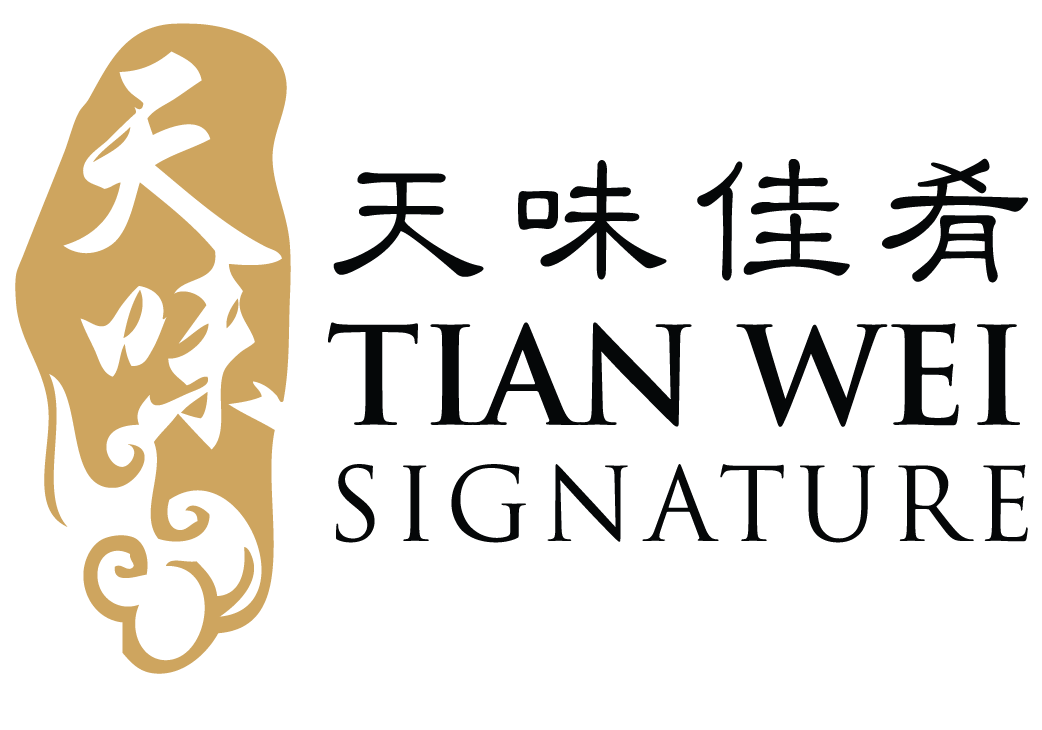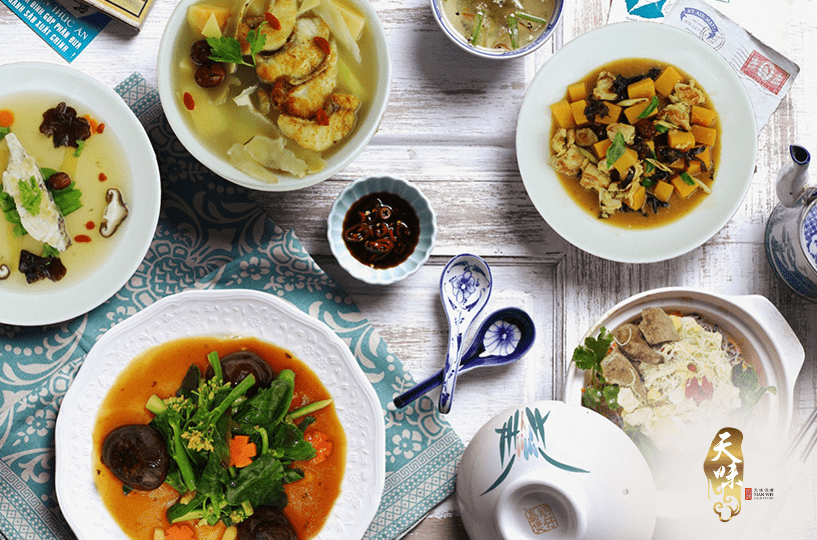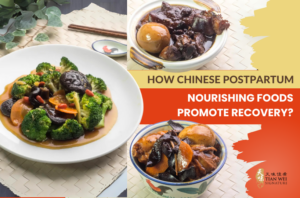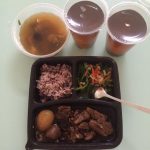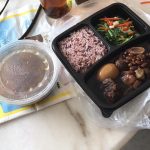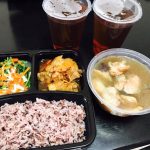81 Tagore Lane, TAG A, #01-11 Singapore 787502 ♦ Reservation : +65 6727 5599
Dietitian Shares: Confinement Diet Vs Normal Diet
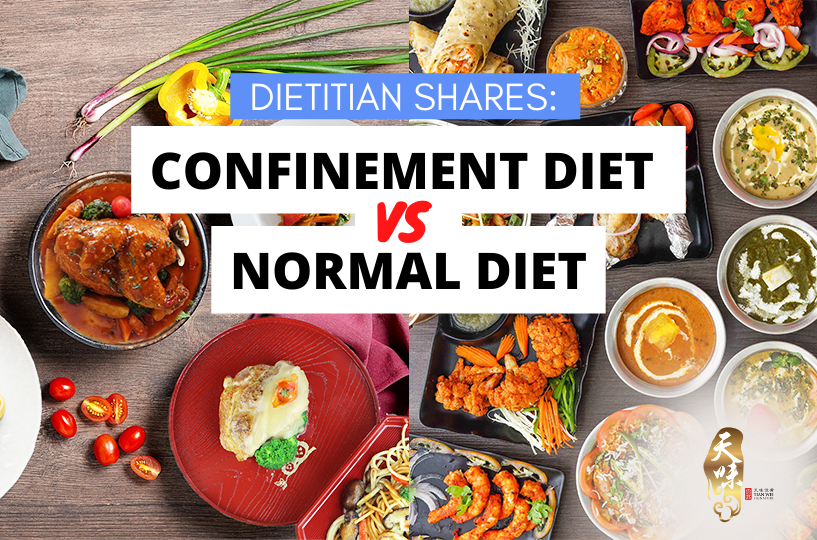
In the eastern side of the world, after giving birth, mummies usually do the month, which is also known as “zuo ye zi”. According to Traditional Chinese Medicine, a mother’s body after labour would have 4 main characteristics that need to be resolved, which are blood deficiency, blood stagnation, qi deficiency and qi stagnation. What she eats, watches, listens to, moves and bathes are all planned out for her so that she recovers from 4 of these issues well and be considered back to good health.
As for the Western side of the world, much of the emphasis is on the baby rather than the mother. Many of the things recommended for mothers to do and pay special attention to are how to breastfeed, how soon to breastfeed and many more! Less emphasis is given to what a mother should eat to recover or even support breastfeeding. Many times, they are merely recommended to eat a healthy diet as how they usually eat before pregnancy. They are left with little to no guidance on how they should eat to recover. Isn’t it such an irony? You have to feed the mother so that she can be well to take care of her baby! Nevertheless, both sides of the coin do have good intentions and concerns. Thus, taking strengths from both perspectives and putting them into how a confinement diet should be for mummies to recover well after childbirth should be the way to go! So here are some key things about how a confinement diet should differ from your normal diet.
Higher in protein due to recovery needs
Due to wound and tear at the perineum, a higher protein diet is needed to promote a smooth and speedy recovery. This is even more true for those with cesarean sections. Foods like fish, chicken and pork provide good quality protein for the body to use to promote wound recovery. Some of the food for confinement mother on Tian Wei Signature’s menu that provide would be from our mains, such as
- Coq Au Vin
- Braised Pork Trotter with Black Vinegar
- Pan Seared Salmon with Creamy Cauliflower
- Sesame Braised Chicken and Dong Po Braised Pork
Higher in iron-rich foods due to blood loss from childbirth
Did you know that you lose about 500ml of blood from giving birth vaginally and about 1000ml of blood from giving birth through a cesarean section? Due to some blood loss from childbirth, we should be supporting our bodies by having iron-rich foods. Iron-rich foods help to provide sufficient iron for the body to produce new red blood cells. It’s no wonder in Traditional Confinement practices in the East, foods like animal liver and kidney are emphasized. However, it’s important not to overdo it as foods like animal liver are also very high in Vitamin A, which may cause Vitamin A toxicity. It is recommended to only take about 1 to 2 servings a week. Some of the dishes that are served on Tian Wei Signature menu are:
- Ee-fu Noodles with Pork liver
- Dry Bak Kut Teh with Liver
- Braised White Vermicelli with Pork Liver
Foods rich in Omega 3- DHA for the brain
There are two main types of Omega 3, which are Docosahexaenoic Acid (DHA) and Alpha-Linolenic Acid (ALA). Omega 3-DHA can only be found in marine sources, typically fish and seafood. Fish that are high in Omega 3-DHA and low in mercury are particularly important for mummies. This is because mercury is known to affect cognitive function and brain development in babies and can leak into breast milk. Thus, low-mercury fish are encouraged instead, like salmon, cod and sea bass. Omega 3-DHA is known to help support brain development in babies and also help to reduce the risk of baby blues and postpartum depression in mummies. General recommendations are to have fish that are low in mercury for at least 2 to 3 times a week to obtain sufficient Omega 3-DHA. Some of our favourite dishes on Tian Wei Signature menu are:
- HK Lime Steamed Salmon
- Seared Salmon with Cauliflower Cream
- Black Sesame Pan-Seared Salmon
Higher fluid intake due to breastfeeding needs
As mummies are breastfeeding up to 8 times a day even after fluid loss from childbirth, it’s only logical that fluid requirements for mummies would increase. Fortunately, herbal soups and confinement red date tea are highly recommended in Traditional Chinese Medicine. Yes, it is mainly for its warming effect, but this is good practice as it would help to keep mothers hydrated throughout this time too. Some mothers may say red date tea for breastfeeding and no drinking of water, especially if they are particular about Traditional practices and Traditional Chinese Medicine principles of only having warming fluids during confinement. However, it’s important to be aware of sugar intake and try to choose less sugar or without sugar as much as possible. If you’re not too restrictive and open to having warm plain water, plain water is also a great choice as you can prevent excessive intake of sugar, which normally comes in sweet drinks. Consuming herbal broth during meal times is a great way to keep your hydration status in check! It’s definitely a bonus when herbal soups like these contain lactogenic ingredients like ginger, fenugreek or fennel that may help to improve breast milk supply! Some of our customer’s favourites are:
- Fenugreek Green Papaya Milky Fish Soup
- Gingko Lotus Seed Pig Stomach Soup
- Eight Treasure Pork Ribs Soup
There are some other things to take care of.
- Stay hydrated by drinking at least 6 to 10 glasses of water per day. The ultimate goal here is to stay hydrated by increasing the intake of fluids. Thus, drinking fresh juice and milk can be done too.
- If you are unable to cook for yourself for obvious reasons, check out confinement food menus in Singapore. Catering is the best option if you don’t have anyone else to cook for you.
How Much Should a Postpartum Mum Eat?
The first thing most women ask is how much they should eat. Now, this clearly depends on your health prior to giving birth. But naturally, since you’ve recently given birth, you will need an extra 200-300 calories to keep your fuel levels topped up. In most cases, a new mother requires about 1,800-2,000 calories a day. The recommended calorie intake can look different if you are breastfeeding or have an active lifestyle.
Why Is Confinement Diet Important During Postpartum?
Here are the four main concerns in mothers that we would want to support mothers for postpartum health.
Wound Healing
Post-birth, mothers may have wounds or tears around their genital area or cesarean section. They may also have a loss of fluids and blood too. This would mean food for confinement should be a diet that is high in protein, and iron is needed to support wound healing. Foods that are a good source of protein and iron are pork, pork inserts, chicken and eggs. Besides that, foods that are rich in vitamins A, C and E are also important to promote collagen so that wounds heal well. Many of these foods can come from green leafy vegetables, carrots, pumpkin, goji berries, capsicums, tomatoes and many more.
Mental Health
Perinatal and postpartum depression and anxiety are real. It affects 10 to 20% of new mothers. Another study reported that 1 in 7 women is diagnosed with postpartum depression in the year after giving birth. We need to be more supportive of mothers! It takes a whole village to raise a child because the mother cannot do everything by herself. Interestingly, researchers have found that diet plays a role in our mental health more than we think! We now know that regular dietary oily fish intake of at least 2 to 3 servings per week is essential to achieve adequate Omega 3-DHA intakes. As Omega 3-DHA has anti-inflammatory properties, such dietary intakes help to reduce the risk of depression, which is affected by inflammation in the brain.
Breastfeeding
 Even after giving birth, a mother’s body still continues to selflessly provide sustenance for the baby. Despite the need to recover and heal, it is amazing how the body gears up to provide breast milk to the newborn. The brilliance in this occurrence is that a mother’s body is almost dependent on breastfeeding in order for her body to recover faster! Thus, the nutritional requirement to support the strength of a woman’s body during this time is much higher. Up to 500kcal extra is needed to support breastfeeding without putting herself at nutritional risk. It is crucial for mothers to not only practice a healthy and balanced diet but also to ensure adequate hydration. Mothers are at risk of being dehydrated and constipated during this time if she is not adequately hydrated. So being creative with how you hydrate yourself is important! You don’t have to only depend on plain water; you can have hydrating foods like a hearty confinement herbal soup, a warm glass of red date tea, a glass of milk or a fresh piece of hydrating fruits like watermelon, papaya or grapes! Many of these can be really nutritious as you recover during postpartum.
Even after giving birth, a mother’s body still continues to selflessly provide sustenance for the baby. Despite the need to recover and heal, it is amazing how the body gears up to provide breast milk to the newborn. The brilliance in this occurrence is that a mother’s body is almost dependent on breastfeeding in order for her body to recover faster! Thus, the nutritional requirement to support the strength of a woman’s body during this time is much higher. Up to 500kcal extra is needed to support breastfeeding without putting herself at nutritional risk. It is crucial for mothers to not only practice a healthy and balanced diet but also to ensure adequate hydration. Mothers are at risk of being dehydrated and constipated during this time if she is not adequately hydrated. So being creative with how you hydrate yourself is important! You don’t have to only depend on plain water; you can have hydrating foods like a hearty confinement herbal soup, a warm glass of red date tea, a glass of milk or a fresh piece of hydrating fruits like watermelon, papaya or grapes! Many of these can be really nutritious as you recover during postpartum.
Reducing Problems in Subsequent Pregnancies & Health Risks Later in Life
During the postpartum period, which stretches up for the next 4 to 6 months, a mother’s body is nourished to recover so that good habits are maintained, and any other bad dietary habits are worked on to be minimized. This is especially important for mothers who have gestational diabetes, who will have a higher risk of having gestational diabetes in subsequent pregnancies and diabetes later in life. This risk can be managed by managing dietary, lifestyle habits and postpartum weight retention. Besides that, other risks to consider minimizing in mothers are risk of hypertension, obesity and cardiovascular health in mothers later on in life.
Conclusion
Thus, the planning and preparations before the arrival of your newborn should include how you would take care of your health during postpartum. One of which is very essential but very often overlooked in importance is how your meals are going to be during your confinement period. If you are unable to have friends or family to support you with your meals during the confinement period, then a confinement food delivery in Singapore service is worth considering. Many of the meals are planned to provide a high-protein diet to support mothers with recovery during the first month of postpartum. Beyond a high protein diet, a good confinement menu plan is one that provides you with adequate vegetables, at least 2 servings of fish per week, minimal repetitions in dishes and makes it enjoyable to hydrate yourself adequately with delicious broth and drinks.
